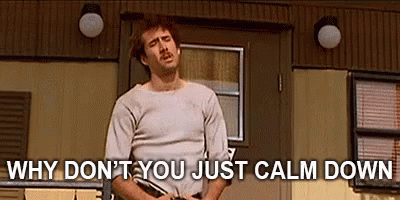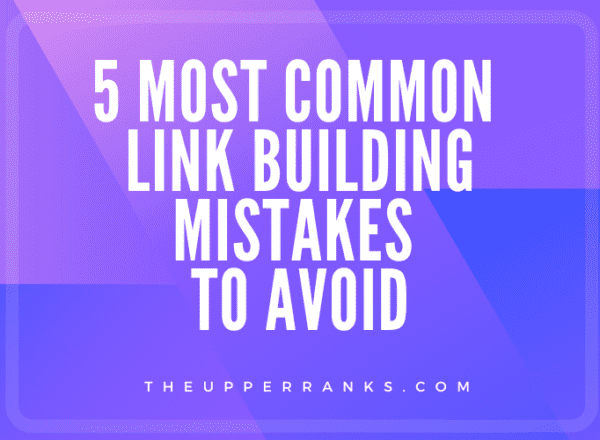There are a number of common link building mistakes that can harm all your hard work and effort. The good news is that these mistakes are fairly easy to correct.
I’ve said it before and I’ll say it again— link building is hard work. It’s also an art where there are no real shortcuts, and no easy way to achieve success.
There are so many factors you have to consider with every single link you build that it’s easy to forget something– or easy to just not consider one crucial piece of the puzzle.
Let’s say you have a great linkable asset.
Let’s also say your link prospecting and outreach are on the money and you have a great set of link building tools and are tracking what your competitors are up to with a backlink checker.
If that’s the case, you’re doing better than 90% of other link builders, but there are still many reasons why you’re not being awarded any backlinks.
Now, of course, some reasons for this may be completely out of your control.
For instance, if a webmaster already decided they’re not adding new links to their website, there’s not much you can do about that.
Or, you may encounter someone who’s planning a website redesign and is temporarily not adding any new links.
And, there are some people you just can’t please, even if you do everything right. Even the best link builders in the world hear “no” about half (or more!) of the time.
I’ve mentioned it before, but I think it bears repeating, just for sanity and peace of mind: no one owes you a link.

They control their own websites, and they are well within their rights to say no to any inquiring link builder.
It’s an unfortunate truth in some ways, but it also helps me put my work into perspective, refocus, and come back to my link building projects with a fresh set of eyes.
If you’re reading this article, I assume you’ve done your research. You have at least one good linkable asset and your outreach is on point. But you’re still not getting the results you want.
So, if that describes you, I want to address some link building factors that are under your control. I’ve been doing this for quite a while, and I’ve made my share of goofs and mistakes.
To be blunt, there are a lot of things on your end that can hinder your link building efforts.
Below, you’ll find five big mistakes which explain why you’re not building a single link to your website, even if it seems like you’re doing everything right.
1. You’re Not a Real Person
Now, of course, I know you’re a real person. Even the most sophisticated robots, well-developed AIs, and best-trained dogs aren’t reading this guide. But sometimes bloggers and webmasters don’t see you as a real person. And they’re not in the business of linking to websites run by robots, AIs, and dogs.
So, how can you let webmasters and bloggers know you’re a real person?

Well, it’s simple really.
Make sure your website has these basic features, and they’re fully fleshed out:
- An ‘about us’ page
- A ‘contact’ page with something beyond a web form
- No pages with ‘thin content’ or leftover lorem ipsum from your recent redesign
- Preferably, a photo of you or someone that works for your company on-site
It really is that simple. But you may be surprised how many businesses and websites don’t even bother to write a comprehensive ‘about us’ page.
If your link prospect can’t find any evidence who your company is, how can you expect them to link to you?
Even if you think you already have good ‘about us’ and ‘contact’ pages, I urge you to revisit them and see if they can be improved. A little humanity plus a personal touch goes a long way.
2. You Have a Popup Problem
Do you remember those glorious days of the internet when we thought we defeated popup ads? For a while there, it seemed like smooth sailing. Browsing the internet could be a soothing experience.
But then, the marketing experts came around and told us we needed to use popups for everything. They told us we needed to serve more ads. They told us we needed to capture our users’ information in every way possible.

If a prospect doesn’t like the amount of popups, ads, and information capture techniques on your site, they’re probably sure their readers won’t like it, either. And, if they’re linking to your site, they’re thinking about their readers actually clicking that link.
Of course, one unintrusive email capture technique, or even a single on-exit popup should be okay. You need to have a call to action somewhere on your site. But so many site owners overdo it to the point that I’d say we’re in the golden age of the popup.
If you think you might have too many popups, check out this guide from Aleh Barysevich. And, if you think your other ads are deterring users, look into this guide from Adam Heitzman.
3. Your UX is Unruly
UX refers to user experience. Here’s a comprehensive explanation, but it basically refers to how easy and enjoyable it is for your audience to use your website. If your UX doesn’t make any sense to your users, you’re in trouble– especially when it comes to link building.
If your link prospect can’t easily navigate your site, sees broken images everywhere, keeps landing on 404 pages, can’t read your small text, or just plain can’t decipher your site on their mobile device, you’re serving up a bad user experience. Which means you won’t be getting a link from that webmaster.
I love what link building legend Julie Joyce had to say about UX and link building in this article:
“It’s very clear: poor usability breaks trust. The problem is that discovering it can take time, and isn’t attached to an easy metric, other than maybe page speed. Again, we’re left with that pesky requirement to actually look at the website upon which we’re seeking links! We have to spend time going through it! And so we should.”
You need to look at your website again using a critical eye. Have someone who’s never visited your website look at it, and ask them if they had any difficulties. If a blogger or webmaster can’t just look around your site in relative ease, you’re not getting that link.
As Julie said, poor usability breaks trust. And you can’t build links without some amount of trust.
4. You’re Too Aggressive with Follow Ups
Initial outreach and follow up outreach are two entirely different things. Even if your initial outreach is golden, you may be too eager with your follow up outreach, which can seem aggressive and off-putting to the person you’re emailing.

Here’s the thing– follow up outreach is entirely necessary for link building. I’d say about 25-30% of the links I build are awarded through persistent and polite follow-up emails. Sometimes things fall through the cracks and a webmaster will forget about your email until you gently remind them again.
People are busy, and they have many other concerns than creating a link to your website. So you do have to put your outreach ‘at the top of the pile’ again with a follow up from time to time.
But, if they perceive you as being too aggressive with those follow-up emails, you’re just going to land on the top of their spam folder.
I usually wait three to five days after an initial email until I follow up, and then I make sure to be brief, polite, and pleasant. I actually may write a guide to follow up outreach at some point. If that’s something you’re interested in, let me know in the comments.
It’s important to be thorough without burning any bridges or annoying your prospects.
5. Your Linkable Asset Isn’t Relevant
Of the five items on this list, this one is the hardest to define. But I’ll do my best to explain.
If your linkable asset doesn’t seem relevant to your prospect, you’re in trouble. And I’m not talking about relevance to your prospect’s website– of course, they’re not going to give your content a second glance if it’s not relevant to what they do.
But what if it doesn’t seem relevant to what you do?

Let’s look at a hypothetical. Let’s say you run an online shoe store, and your linkable asset is a guide to living healthy with type 2 diabetes. You and your marketing team decided that since you sell a few pairs of medically certified diabetic shoes, that writing a general piece about type 2 diabetes is a good linkable asset.
You convinced yourself that it was relevant. And, as it turns out, we can go to the ends of the earth to justify anything we think is a good idea.
But your prospect doesn’t get the relevance. They just see an eCommerce store writing about diabetes, looking for links. To them, it seems irrelevant and untrustworthy.
Now, if you hone your focus to just write about medical certified diabetic shoes, they might be more likely to award that link, because it’s easy to see a connection between a shoe store and diabetic-friendly footwear. But a general piece about type 2 diabetes is much more of a stretch.
Linkable assets take time and cost money. Before you invest in one, you need to make sure it directly relates to what you do– either in subject matter, or in a geographical sense (if you’re a locally-based business, a linkable asset about your location is always okay).
Even if your linkable asset is excellent, if a prospect doesn’t see it as relevant to what you do, they’ll tend to think you’re trying to pull the wool over their eyes.
Wrapping It All Up
As you’ve probably noticed, four out of five of these problems can stem from your website. The other stems from your email techniques.
No one in the world wants to link to a crappy website. But we’re often biased towards our own websites, just because we’ve put so much time and effort into them. It’s worth taking a critical eye to each little part of your website, and seeing it through your link building prospect’s eyes.
Link building is just as much about small, interlocking parts as it is about the big picture.
As for aggressive email follow-ups, that’s a bit easier to take care of.
So much about link building is seeing your website, and the link you’re asking for, through someone else’s eyes. It’s about empathy– you can’t ask someone to do something you’re not willing to do.
If you’re here, it’s because your content and your outreach are already top-notch, but there’s another problem. Hopefully, by taking a thoughtful and critical eye to your own website and actions, you’ll start hearing “no” much less, and start hearing “yes” much more often.

Comments
Hi David,
This is an impressive article. Many linkbuilding articles just assume that bloggers are giving out links like candy. However, that couldn’t be farther from the truth. A realistic linkbuilder knows that a 20% success in their outreach campaign is a great achievement. No matter how great they are at linkbuilding (except when they are big names in the industry), they know that getting a link requires a ton of patience, awesome content, and a great deal of relationship building. And even then, you may not get the link.
But this article is awesome as it helps at least clarify why that may be the case and how to avoid it as much as possible. Although, some bloggers simply just don’t give out links, and nothing you do can change their minds.
Thank you for sharing!
Very interesting considerations about link building pitfalls, Thanks!